Italy’s Meloni says ICC complaint accuses her of Gaza genocide complicity
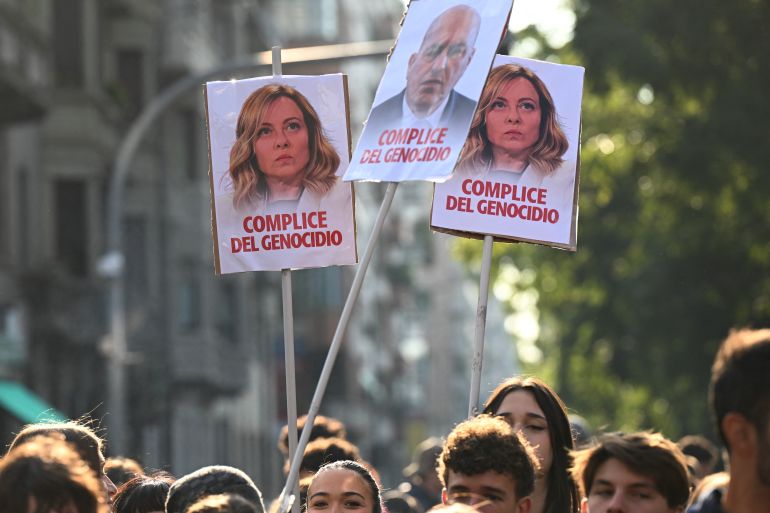
Italian Prime Minister Giorgia Meloni says she has been accused of “complicity in genocide” in a complaint lodged with the International Criminal Court (ICC) over Rome’s support for Israel as it bombards Gaza. Meloni made the statement during an interview with state television company RAI, in the first public comment on the situation, which has not been confirmed by the international court. Recommended Stories list of 4 itemsend of list Meloni said Defence Minister Guido Crosetto and Foreign Minister Antonio Tajani have also been “denounced”, referring to when the court is officially alerted to a possible crime. She said that she believes that Roberto Cingolani, head of Italian weapons and aerospace company Leonardo, might also have been named. The complaint, dated October 1, was signed by some 50 people, including law professors, lawyers, and several public figures who accused Meloni and others of complicity by supplying arms to Israel, according to the AFP news agency. “By supporting the Israeli government, particularly through the supply of lethal weapons, the Italian government has become complicit in the ongoing genocide and the extremely serious war crimes and crimes against humanity committed against the Palestinian people,” the authors of the court filing against the Italian leaders wrote. The Palestinian advocacy group behind the complaint naming Meloni is calling for the court to assess the possibility of opening a formal investigation into the charge of genocide against the Italian prime minister, AFP also reported. Advertisement Last month, a UN Independent Inquiry found that Israel’s war on Gaza is a genocide, adding to similar assessments from a broad range of experts in human rights, genocide and international law. The ICC has outstanding arrest warrants for Israeli Prime Minister Benjamin Netanyahu and former Defence Minister Yoav Gallant over charges of war crimes and crimes against humanity in Gaza, including starvation, murder and persecution. However, neither Netanyahu nor Gallant has been charged with genocide specifically. The ICC also issued arrest warrants for Hamas officials; however, those named have all since been killed in Israeli attacks. “I don’t think there is another case in the world or in history of a complaint of this kind,” Meloni said of the complaint against her in the televised comments. Pro-Palestinian demonstrators hold placards of Meloni reading ‘Accomplice to genocide’ at a protest against Israeli forces intercepting the Global Sumud Flotilla, in Milan on Friday [Stefano Rellandini/AFP] ‘Major arms’ exports According to data from the Stockholm International Peace Research Institute (SIPRI), Italy was one of only three countries to export “major conventional arms” to Israel from 2020 to 2024, although the United States and Germany were responsible for 99 percent of the exports of the larger weapons category, which include aircraft, missiles, tanks and air defence systems. The major arms that Italy provided to Israel in this period included light helicopters and naval guns, SIPRI said. It is also one of several countries involved in making parts for F-35 fighter jets, under a US-led programme, SIPRI added. “Concerns about the potential use of the F-35 by Israel to carry out violations of international humanitarian law have led to much criticism of transfers of the aircraft or its parts to Israel,” SIPRI said in a recent report. Italy’s Defence Minister Guido Crosetto has said that Italy is only sending deliveries of arms to Israel under contracts signed before October 7, 2023 and that Italy has sought assurances from Israel that the weapons would not be used against civilians in Gaza, after Deputy Prime Minister Antonio Tajani had earlier claimed Italy had stopped sending the weapons altogether. Meloni’s acknowledgement of the complaint against her comes as hundreds of thousands of people have taken to the streets in mass protests against Israel’s war on Gaza in recent weeks. Italy’s major labour unions have actively supported the protests. The country’s dockworkers have threatened strike action over Israeli forces preventing the Sumud Global Flotilla from delivering aid to Gaza. Advertisement Following earlier protests, Meloni’s government sent naval ships to accompany the fleet of international vessels, but the Italian navy pulled back before Israeli forces intercepted the boats in international waters and detained close to 500 international activists. Six crew members remained in Israeli detention as of Tuesday, according to the flotilla’s organisers. Mounting legal challenges The latest complaints against Italian leaders join a growing number of legal challenges to Israel’s actions in Gaza, alongside the ICC case against Netanyahu and Gallant. At the International Court of Justice (ICJ), South Africa has submitted a case against Israel, accusing it of breaching the 1948 UN Genocide Convention. In April this year, the ICJ ruled against pursuing a case brought by Nicaragua that accused Germany of aiding genocide in Gaza for its role in selling arms to Israel. The US, which is the largest exporter of weapons to Israel, is not a member of the ICC. It has also actively pushed back against the ICC pursuing charges against Israel. Last month, US Secretary of State Marco Rubio announced that the US was imposing sanctions on three Palestinian human rights organisations, Al-Haq, the Palestinian Centre for Human Rights (PCHR) and Al Mezan Center for Human Rights, for engaging in efforts to “investigate, arrest, detain, or prosecute Israeli nationals” at the ICC. Adblock test (Why?)
Italy to propose global ceasefire for 2026 Winter Olympics
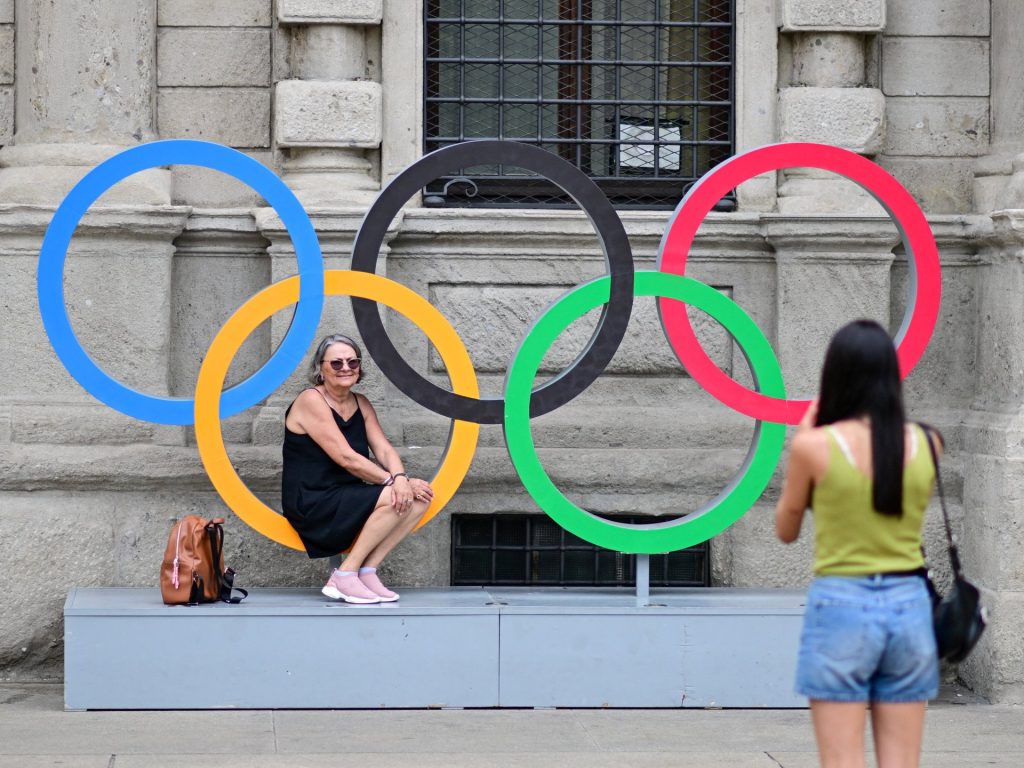
A global truce for the duration of February’s 2026 Winter Olympics in Milano Cortina will be sought by hosts Italy. Published On 7 Oct 20257 Oct 2025 Click here to share on social media share2 Share Italy will submit a proposal for a worldwide ceasefire to the United Nations before next year’s Milano Cortina Winter Olympics, Minister of Foreign Affairs Antonio Tajani said. As a concept, a global truce during the Olympics dates to the ancient games in Greece, where warring factions agreed to put down their arms for the duration of the event, so that athletes could safely travel to and from ancient Olympia. Recommended Stories list of 4 itemsend of list Calls by Olympics organisers and the UN for global ceasefires have not been heeded on the occasion of modern-era Games since 1896, including the 2024 Paris Olympics. The Milano Cortina Games open on February 6 and run to February 22. “In view of the Milano Cortina Olympics, we are presenting a proposal for an Olympic truce for all wars, including Ukraine and the Middle East, to the United Nations,” Tajani said on Tuesday. “We must be champions of peace,” he said on the sidelines of an international conference in Rome. “We support the US plan (to end the war in Gaza), and, as Pope Leo has said, we must never give up hoping for peace.” The 20-point plan presented by United States President Donald Trump, on which Israel and Hamas began indirect talks on Monday, is seen as the most promising initiative to end a war that has killed more than 67,000 Palestinians since October 7, 2023. The Hamas-led attack on Israel that day killed 1,200 people. Tuesday marked the second anniversary of the war on Gaza. In response to Gaza’s devastation and humanitarian disaster wrought by Israel’s military campaign, a number of major Western countries, though not Italy, have formally recognised Palestinian statehood, endorsing longstanding Palestinian aspirations to an independent homeland on Israeli-occupied land. Advertisement In Ukraine, the pro-Western government has been battling a Russian invasion for more than three and a half years, in Europe’s biggest armed conflict since World War II and one that has killed hundreds of thousands of people. Adblock test (Why?)
German mayor-elect gravely wounded in stabbing attack
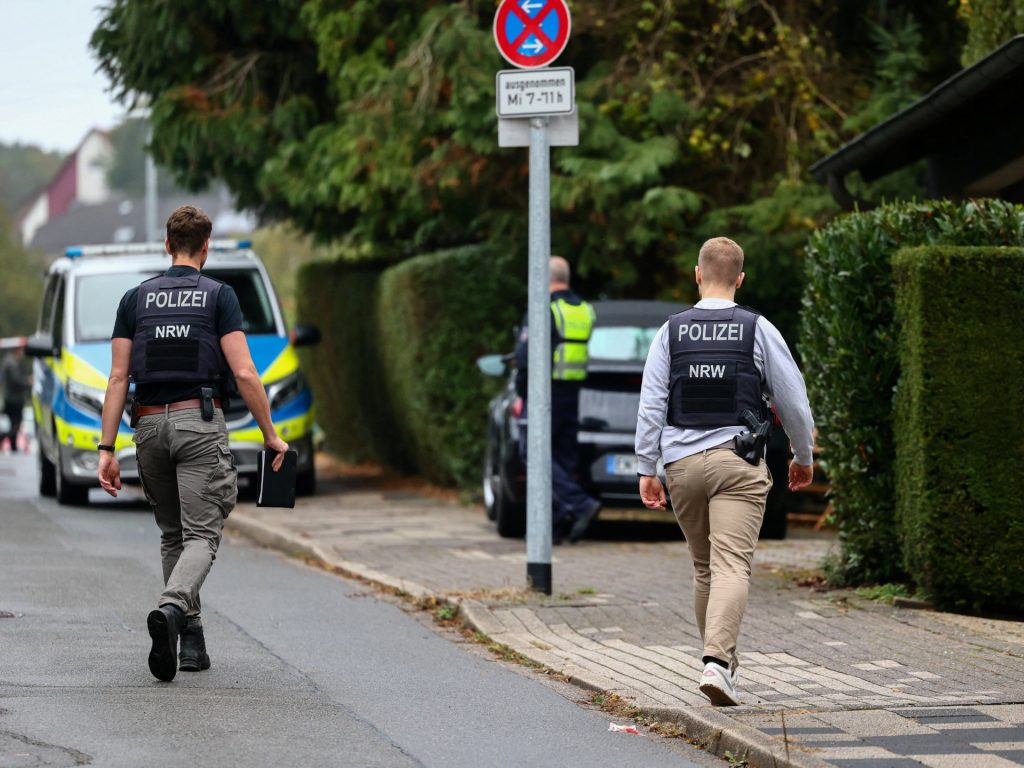
Chancellor Friedrich Merz condemns ‘heinous attack’ after Iris Stalzer, mayor-elect of Herdecke, stabbed. Published On 7 Oct 20257 Oct 2025 Click here to share on social media share2 Share A newly elected mayor in western Germany has been critically injured in a stabbing attack, according to German media reports. Iris Stalzer, the 57-year-old mayor-elect of the North Rhine-Westphalia town of Herdecke, was stabbed in front of her home about noon (10:00 GMT) on Tuesday, leaving her with life-threatening injuries, Germany’s WDR broadcaster reported, quoting local police. Recommended Stories list of 3 itemsend of list Chancellor Friedrich Merz condemned the “heinous attack” and called for a swift investigation. “We fear for the life of the designated mayor, Iris Stalzer, and hope for her full recovery,” he wrote in a post on X. According to WDR, Stalzer was repeatedly stabbed before managing to haul herself inside her home, where her children called rescue services. After finding Stalzer severely injured, rescue workers sent her to a hospital on a helicopter, according to Germany’s Deutsche Welle broadcaster. Stalzer’s teenage son told authorities his mother had been attacked by several men, Germany’s Bild newspaper reported. Further details about the attack or potential motives were not immediately clear. Stalzer, a member of the centre-left Social Democratic Party, was elected mayor of the town of 22,000 people in the eastern Ruhr area on September 28. The attack came after a regionwide campaign that politicians in North Rhine-Westphalia, Germany’s largest state, described as unusually hostile. A recent study found 60 percent of politicians in Germany had experienced violence at least once, with one in five saying it had made them more reluctant to appear in public. Advertisement In 2019, a conservative district government president in the state of Hesse, Walter Luebcke, a supporter of then-Chancellor Angela Merkel’s refugee policy, was shot dead by a far-right activist on his home terrace. Four years before that, Henriette Reker was stabbed by a man with anti-immigration views the day before being elected mayor of Cologne. She made a full recovery and is due to leave office later this year. Adblock test (Why?)
Italy-Israel World Cup tie faces security concerns amid protests
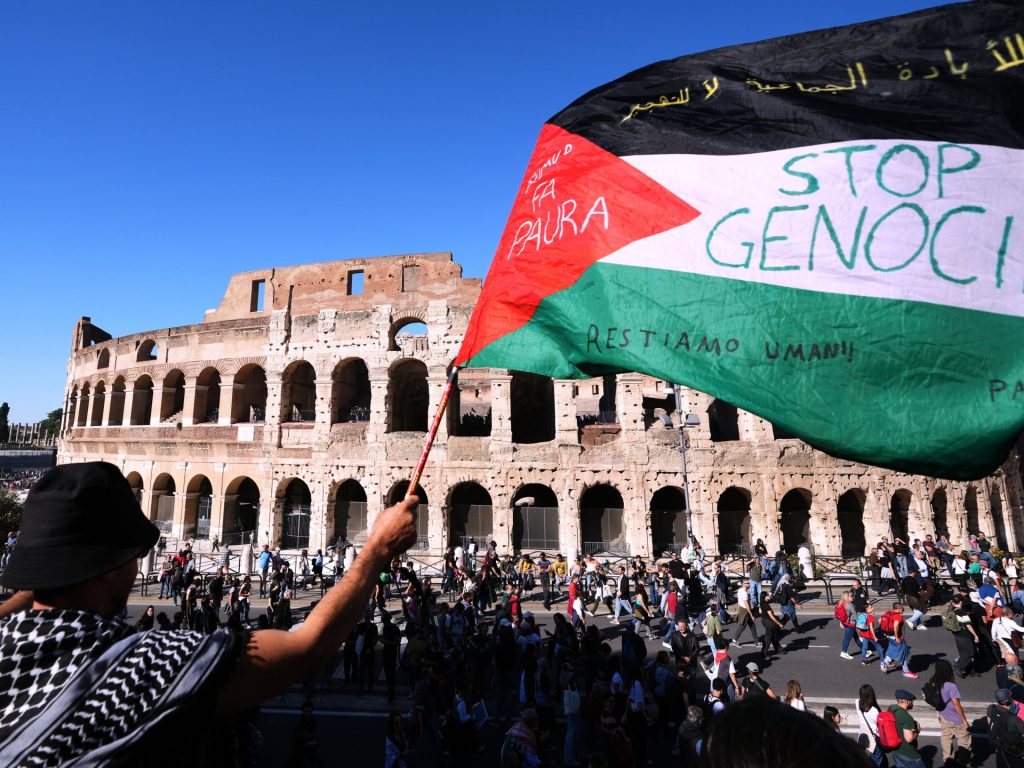
Italy host Israel in a World Cup qualifier on October 14, in Udine where the stadium only holds 6,000 spectators. Published On 7 Oct 20257 Oct 2025 Click here to share on social media share2 Share Israel’s World Cup qualifying match in Italy next week is expected to attract more pro-Palestinian protesters outside the football stadium in Udine than ticket-holding spectators inside the arena. Protesters already approached the gates of Italy’s training centre in Florence last week to demand that the match not be played because of the war in Gaza — part of a national strike that saw millions of activists take to the streets. Recommended Stories list of 4 itemsend of list “It’s not going to be a calm environment,” Italy coach Gennaro Gattuso acknowledged Tuesday from inside the Coverciano training centre that was targeted. “There will be 10,000 people outside the stadium and 5-6,000 inside the stadium.” As of Monday, only 4,000 tickets were sold for next Tuesday’s match at Stadio Friuli. While UEFA had been considering suspending Israel over the war and Udine Mayor Alberto Felice De Toni had called for the game to be postponed, with Italy desperately attempting to avoid failing to qualify for a third consecutive World Cup, the four-time champion team doesn’t plan to risk not playing. “We have to play this match. Because if we don’t, we’ll lose it 3-0,” Gattuso said, referring to the rule for forfeited matches. “[Italian Football Federation] president [Gabriele] Gravina explained that very well.” There was also tension on the field between the two squads after the final whistle when Italy edged Israel 5-4 in a nine-goal thriller last month in neutral Hungary — where Israel has been playing its “home” matches during the war. The protesters in Italy and elsewhere have also been reacting to an international aid mission blocked by Israeli forces. Advertisement “It’s upsetting to see what’s happening to innocent people and children,” Gattuso said. “It hurts your heart.” Italy and Israel are level six points behind group leader Norway, with only the first-place finisher in the group to qualify directly for next year’s tournament in North America. The second-place finishers progress to a playoff — the stage where Italy was eliminated by Sweden and North Macedonia and ruled out of the 2018 and 2022 World Cups, respectively. “Considering that we’re trying to get to the World Cup and we need to give our absolute all, I’m sure you can understand that I would have preferred to play a home game with the enthusiasm that we saw in Bergamo a month ago,” Gattuso said, referring to a 5-0 win over Estonia. Israel could also face protests during a visit to Norway on Saturday. The Norwegian soccer federation pledged to give its profits from ticket sales for the game in Oslo to humanitarian work in Gaza by Doctors Without Borders (known by its French acronym, MSF). Italy played Israel in Udine last October in the Nations League. That game went off without incident amid a heavy police presence and despite a pro-Palestinian demonstration before the game. Italy won 4-1. The Italian Football Coaches’ Association (AIAC) wrote to the Italian Football Federation in August, in a letter to be forwarded to European and world football’s governing bodies, calling for Israel to be suspended from international competition due to its war on Gaza. Adblock test (Why?)
Day one of Gaza peace talks ends on ‘positive’ note in Egypt
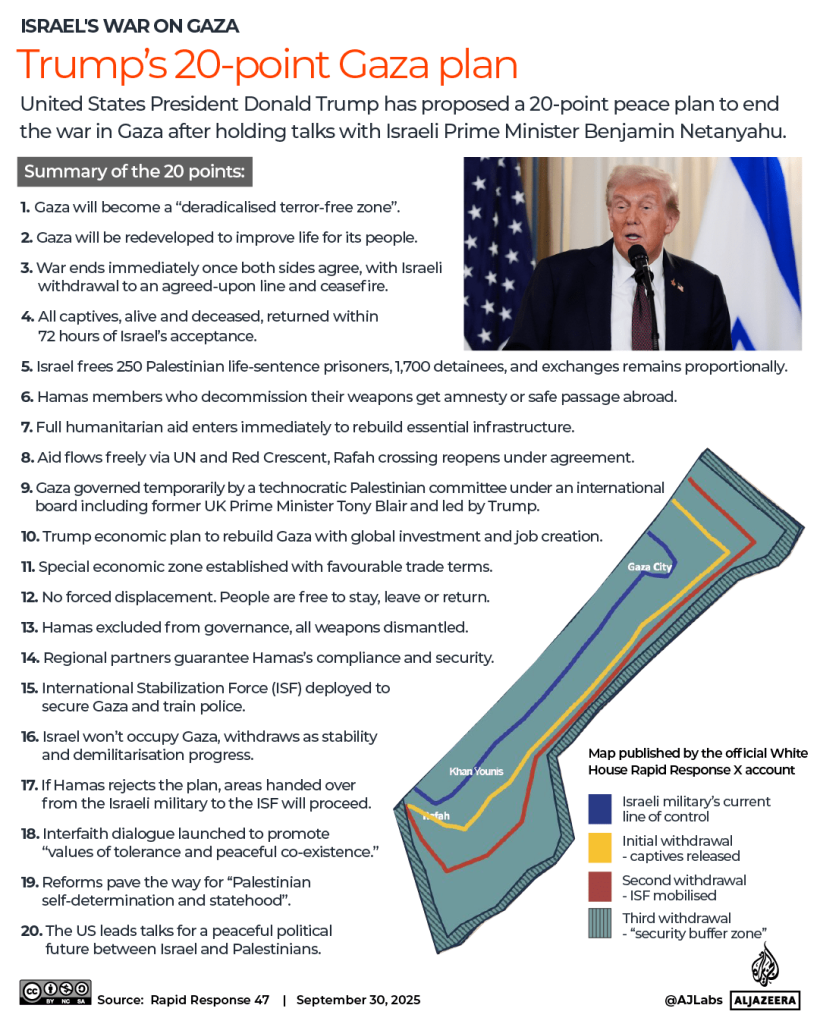
Sources familiar with the mediated talks between Israel and Hamas say that progress was made on Monday, with negotiations to continue. The first day of resumed indirect talks between Israel and Hamas in Egypt ended on a positive note, amid hopes of a potential deal to implement US President Donald Trump’s 20-point plan to end the war on Gaza, multiple sources told Al Jazeera and other media outlets. Negotiators are set to return for more discussions on Tuesday. Recommended Stories list of 4 itemsend of list Sources told Al Jazeera Arabic that the meeting in the Red Sea resort city of Sharm el-Sheikh on Monday was “positive” and that a roadmap was drawn up for how the current round of talks would continue. The Hamas delegation told mediators that Israel’s continued bombing of Gaza poses a challenge to negotiations on the release of captives, Al Jazeera Arabic reported. The Hamas delegation included Hamas leaders Khalil al-Hayya and Zaher Jabarin, two negotiators who survived an Israeli assassination attempt in central Doha that killed five people last month. Talks on day one covered the proposed exchange of prisoners and captives, a ceasefire, and humanitarian aid entering Gaza, according to Egypt’s state-linked Al-Qahera News. White House Press Secretary Karoline Leavitt also said Trump was pushing for an early exchange of Israeli captives and Palestinian prisoners, in a bid to build “momentum” to implement other parts of his plan to end the Gaza war. “The technical teams are discussing that as we speak, to ensure that the environment is perfect to release those hostages,” Leavitt said, adding that teams were “going over the list of both the Israeli hostages and also the political prisoners who will be released.” Advertisement Trump, speaking to reporters from the Oval Office on Monday afternoon, said that “we have a really good chance of making a deal”, while also noting that he still has his own “red lines”. “But I think we’re doing very well. And I think Hamas has been agreeing to things that are very important”, Trump added. Al Jazeera’s Rosiland Jordan reporting from Washington, DC, said that Trump had not “not given any details of how he thinks the discussions are going beyond his general positive assessment.” “The US President also was very complimentary of the joint Arab-Turkish support to keep Hamas at the bargaining table, he was complimentary of the Israeli people and of course, he was complimentary about his own special envoy, Steve Witkoff, who was leading the US delegation in these negotiations,” said Jordan. Trump’s son-in-law Jared Kushner, a real estate developer, is also reportedly part of the US delegation. Egypt’s Al-Qahera News, meanwhile, confirmed that the talks were expected to continue on Tuesday, which marks two years since the Hamas attack on Israel that killed 1,139 people and saw about 200 people taken captive. Since then, Israeli forces have killed at least 67,160 Palestinians and wounded 169,679 in Gaza, in a war that has been described as genocidal by a United Nations inquiry, leading genocide scholars and leading human rights groups — including Israeli non-profits. And even as the talks were held on Monday, Israeli forces killed at least 10 Palestinians in attacks across Gaza, including three who were seeking humanitarian aid, according to Al Jazeera sources. UN Secretary-General Antonio Guterres shared a social media post late on Monday, New York time, acknowledging the two year anniversary of Hamas’s “abhorrent large-scale terror attack on Israel”, on October 7, 2023. Guterres also said that the “recent proposal” put forward by Trump “presents an opportunity that must be seized to bring this tragic conflict to an end.” “A permanent ceasefire and a credible political process are essential to prevent further bloodshed and pave the way for peace,” the UN chief wrote. Adblock test (Why?)
Trump walks back offer to talk to Democrats as government shutdown extends
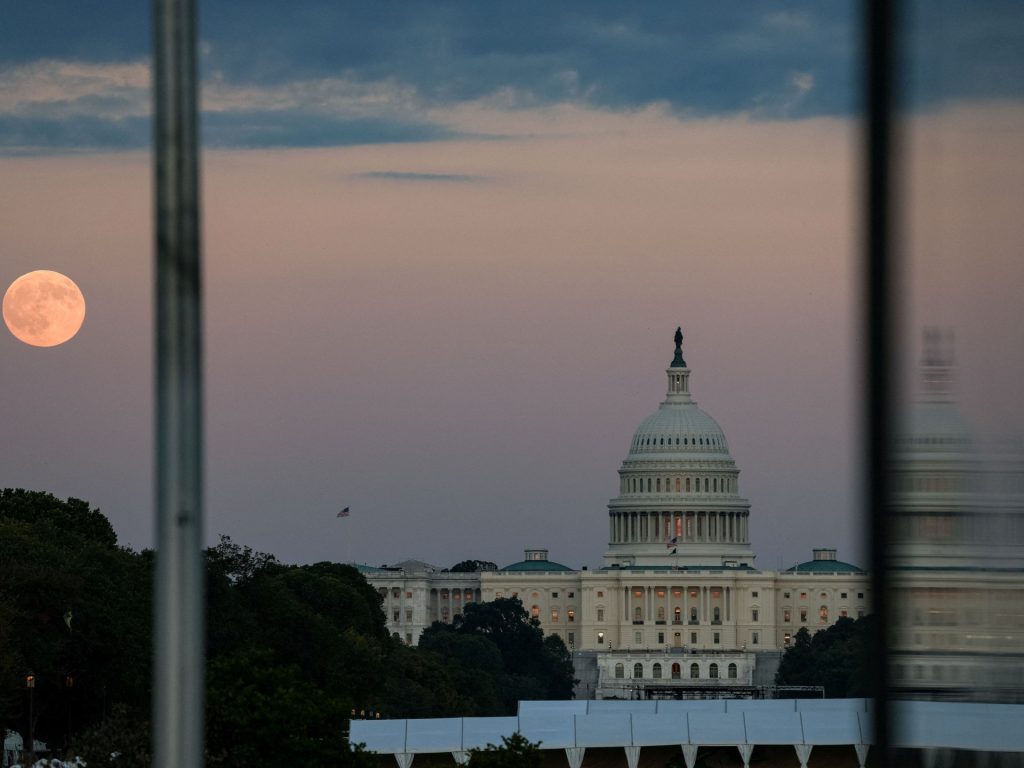
Published On 7 Oct 20257 Oct 2025 Click here to share on social media share2 Share US President Donald Trump suggested on Monday that he was ready to negotiate with Democrats over healthcare subsidies to break a deadlock over the continuing government shutdown, before walking back on that offer. Trump put the blame for the shutdown — which is entering its seventh day — on Democrats in a post on social media, where he said they must end the shutdown before substantive negotiations can begin over healthcare policy – the key issue underlying the shutdown. Recommended Stories list of 4 itemsend of list “I am happy to work with the Democrats on their Failed Healthcare Policies, or anything else, but first they must allow our Government to re-open. In fact, they should open our Government tonight! ” Trump wrote in a Truth Social post on Monday evening. Just hours earlier at the Oval Office, Trump told reporters he would like to “see a deal made for great healthcare,” according to CBS News. “We have a negotiation going on right now with the Democrats that could lead to very good things, and I’m talking about good things with regard to healthcare,” Trump was quoted as saying. Senate Minority Leader Chuck Schumer, one of the Democratic Party’s highest-ranking members, quickly denied that Democrats were in talks with Trump. “This isn’t true,” Schumer said in a statement shared on X. “If Republicans are finally ready to sit down and get something done on healthcare for American families, Democrats will be there – ready to make it happen,” Schumer added. THIS ISN’T TRUE. For months, Democrats have been demanding Trump and Republicans come to the table and work with us to deliver lower costs and better healthcare for the American people. If Republicans are finally ready to sit down and get something done on health care for… https://t.co/dvm4kGVJwq — Chuck Schumer (@SenSchumer) October 6, 2025 Advertisement Trump’s remarks came as the Senate on Monday evening again failed to pass a Republican-sponsored bill to extend government spending until the end of November. The vote of 52 in favour, 42 against, was eight votes short of the 60-vote threshold needed to pass the bill, according to Senate vote records. Democrats hold a minority in both houses of Congress, and they are trying to use the spending bill to force Republicans to negotiate over critical healthcare spending. Democrats want Congress to extend expiring subsidies before the US healthcare enrolment period begins in November and reverse cuts to Medicaid assistance for low-income and disabled US residents. A Democratic version of the spending bill that extends funding through October 31 and makes the subsidies permanent also failed 45 to 55 on Monday in a vote along party lines. The Kaiser Family Foundation, a non-partisan non-profit focused on healthcare policy, predicts that once the subsidies expire, healthcare premiums will “more than double what subsidised enrollees currently pay annually for premiums.” Adblock test (Why?)
How Ladakh protest leader Sonam Wangchuk went from Indian hero to ‘traitor’
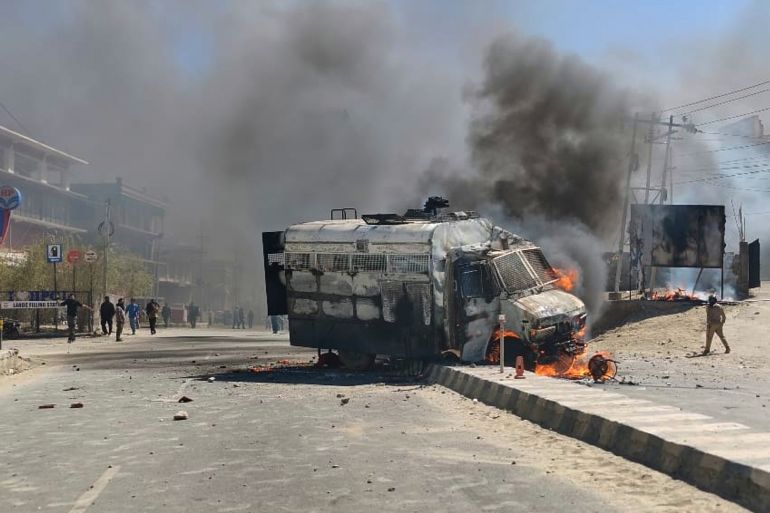
New Delhi, India — On the night of August 5, 2019, hundreds of Kashmiris were arrested amid a crackdown by Indian security forces that followed the Indian government’s decision to strip the region of its special rights and status as a state. Sonam Wangchuk celebrated, and thanked Indian Prime Minister Narendra Modi. “THANK YOU PRIME MINISTER,” he wrote on X, then Twitter, “for fulfilling Ladakh’s longstanding dream.” One of India’s best-known innovators and education reformers, Wangchuk was referring to a decades-long demand from many in Ladakh, for the cold desert bordering China to be separated from Jammu and Kashmir, the Indian-administered part of the disputed region that Pakistan also claims. Until August 2019, Ladakh was part of Jammu and Kashmir. With the Modi government’s move, it had been made a separate administrative entity, a so-called union territory to be governed federally by New Delhi. But while the rest of Jammu and Kashmir — also reduced to a union territory from a state — was allowed to keep a locally elected legislature, Ladakh was not. That lack of any say over their future would slowly turn the peaceful Ladakh into a tinderbox of political unrest against Modi’s government in the subsequent six years. And leading that protest movement is a disillusioned Wangchuk. On September 26, Wangchuk was arrested and transported more than a thousand miles from home to jail in Jodhpur, Rajasthan, charged with “anti-national” activities, conspiring to overthrow the government, after a breakaway group from his protest engaged in violent clashes with security forces. Indian paramilitary soldiers shot dead four protesters, after they had set the local office of Modi’s Bharatiya Janata Party on fire, and authorities accused Wangchuk of instigating the violence. Advertisement The same BJP and Modi government had previously turned to Wangchuk for promotional campaigns in Ladakh. BJP-led governments in other states had sought his advice as an educationist. Today, that one-time poster child, the inspiration for one of Bollywood’s most iconic and successful movies ever, stands accused of treason — with officials imputing a possible Pakistan hand behind his campaign for constitutional rights for Ladakh. “Suddenly, in a month, the same government that was decorating him is calling him an anti-national,” Gitanjali Angmo, Wangchuk’s wife, told Al Jazeera. “The writing is on the wall: this is to silence him, to scare him because they could not buy him.” A police vehicle is set on fire during a protest by locals demanding federal statehood from the Indian government, in the high-altitude Leh town, in the region of Ladakh, India, Wednesday, September 24, 2025 [AP Photo] ‘Grief in Leh’ Early in September, local activists in Ladakh, led by Wangchuk, began a hunger strike. It was the latest in a series of peaceful protests they had held in recent years demanding constitutional protections under what is known as the Sixth Schedule. That statute allows parts of India that are predominantly inhabited by Indigenous tribes autonomous administrative and governance structures. More than 90 percent of Ladakh’s population consists of such tribes. But on the 15th day of the strike, some youth-led demonstrators broke away and torched the BJP office in Leh, Ladakh’s capital, on September 24. Security forces fired back: Four people, including a veteran soldier, were killed and dozens were left injured. The administration then launched a massive crackdown, detaining over 80 people, including the protest leaders who had been earlier sitting on a peaceful hunger strike. Wangchuk was arrested under the National Security Act, a preventive detention law that allows imprisonment without trial for a year. Over a dozen local activists surrendered to the police in solidarity with Wangchuk and other detainees. It was the worst violence and crackdown in the modern history of Ladakh. Stanzin Dorje, a local businessman in Leh in his late thirties, had sat next to Wangchuk and others, joining the hunger strike. But amid the crackdown, he was — like the rest of Ladakh — restricted to his home under an unprecedented curfew-like deployment of armed forces on the streets of Leh. Dorje grew increasingly despondent, his friends said. On Wednesday, Stanzin died by suicide. He is survived by his wife and two children. Advertisement “He was Sonam’s fan. He kept asking about him, kept taking his name,” said Tsering Dorje, the president of Ladakh Buddhist Association, a local group central to protests. Stanzin was also a member of the association’s general council. “He felt agitated and very sad. We are all asking, ‘What was [Wangchuk’s] crime? He was just sitting there. Why did they arrest him and send him to a jail outside [Ladakh]?” said Dorje. Wangchuk’s rise from an engineer next door to an icon of Indian ingenuity and sustainable living made him a local icon, Dorje said, where young people looked up to him. “We are all grieving in Leh for our people, martyred or jailed,” he added. A national hero Born in Uleytokpo, a mountain village about 70km from Leh, in 1966, Wangchuk was home-schooled by his mother, Tsering Wangmo, till he was nine. In 1975, when his father, Sonam Wangyal, a politician, became a minister in the Jammu and Kashmir government, the family moved to Srinagar, the capital of Indian-administered Kashmir. But Wangchuk struggled in Srinagar schools because he spoke only Ladakhi, while classes were taught in Urdu and Kashmiri. So he moved to a school in New Delhi for high school, and went on to study mechanical engineering at the National Institute of Technology in Srinagar. In 1988, soon after graduating, he co-founded the alternative school model SECMOL, or Students’ Educational and Cultural Movement of Ladakh, with other students to reform the education system in Ladakh. Until then, nearly 95 percent of Ladakhi students failed their state exams amid a struggle with the curriculum which was in Urdu — a language alien to many in Ladakh — and other cultural barriers. Urdu, spoken much more widely in Kashmir, was the dominant language of the state when it was a unified entity. At SECMOL, the number of students clearing
Ukraine’s Zelenskyy says Western parts found in Russian drones, missiles
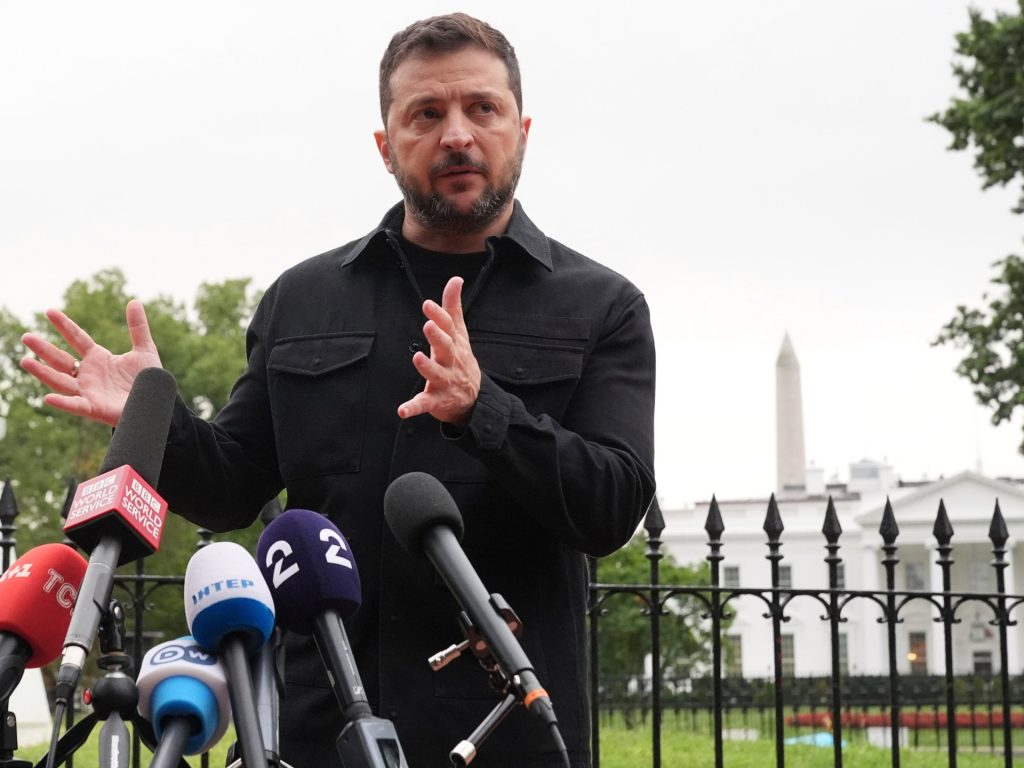
Pressing for stiffened sanctions, president says more than 100,000 components from US, UK and other suppliers found in Russian missiles and drones fired on Ukraine. Ukrainian President Volodymyr Zelenskyy has alleged that drones and missiles fired by Russia against his country are filled with parts sourced from Western companies. In a social media post on Monday, Zelenskyy said the hundreds of weapons used in Russian attacks over the previous two nights contained tens of thousands of components produced by firms in the United States, United Kingdom, Germany, Switzerland, Japan, South Korea, the Netherlands, Taiwan and China. Recommended Stories list of 3 itemsend of list “Nearly 100,688 of foreign-made parts were in the launched attack drones, about 1,500 were in Iskanders, 192 in Kinzhal missiles, and 405 in Kalibrs,” he wrote. He made the accusation as Ukraine and some European partners are pressing for harsher sanctions and stronger oversight to close loopholes on current trade limits imposed in the wake of Russia’s invasion of its neighbouring country in February 2022. Zelenskyy’s inclusion of US and UK companies was noteworthy due to the leading role the two countries have had in mobilising military and financial support for Ukraine as it battles Russia’s invading forces. US companies manufacture converters for Kh-101 missiles and Shahed-type drones, sensors for unmanned aerial vehicles and Kinzhal missiles, and microelectronics for missiles, the Ukrainian president said. He added that British companies produce microcomputers for drone flight control. “Ukraine is preparing new sanctions against those who help Russia and its war,” Zelenskyy said, adding that detailed data on each company and product have been shared with Ukraine’s partners. Advertisement Zelenskyy, who has long called on countries around the world to prevent the funding and equipping of Russia’s war machine, demanded more robust measures before a meeting of G7 sanctions coordinators, a body that oversees sanctions regimes among the club of the world’s wealthiest countries. Oleh Alexandrov, a Ukrainian intelligence official, said over the weekend that Kyiv has evidence that China has been helping Moscow identify targets in Ukraine. He said there was “evidence of a high level of cooperation between Russia and China in conducting satellite reconnaissance of the territory of Ukraine in order to identify and further explore strategic objects for targeting”. Kremlin spokesperson Dmitry Peskov denied reliance on China’s satellites and said Russia has its “own capabilities, including space capabilities, to accomplish all the tasks the special military operation poses”. Zelenskyy issued his statement as a number of European countries have been dealing with a wave of suspicious drone activity. Unmanned aerial vehicles have been spotted over military sites and disrupted air traffic. Some governments have pointed a finger at Russia and warned that Moscow is testing NATO’s air defences. Russia has denied responsibility, and President Vladimir Putin has mocked countries accusing Moscow of being behind the drone incursions. On Monday, the Kremlin dismissed as “baseless” comments by German Chancellor Friedrich Merz, who said his country assumes Russia was behind the activity. Oslo Airport, meanwhile, temporarily suspended several landings on Monday after reports of a drone, its operator, Avinor, said. Adblock test (Why?)
Conservative writer Bari Weiss named editor-in-chief of CBS News
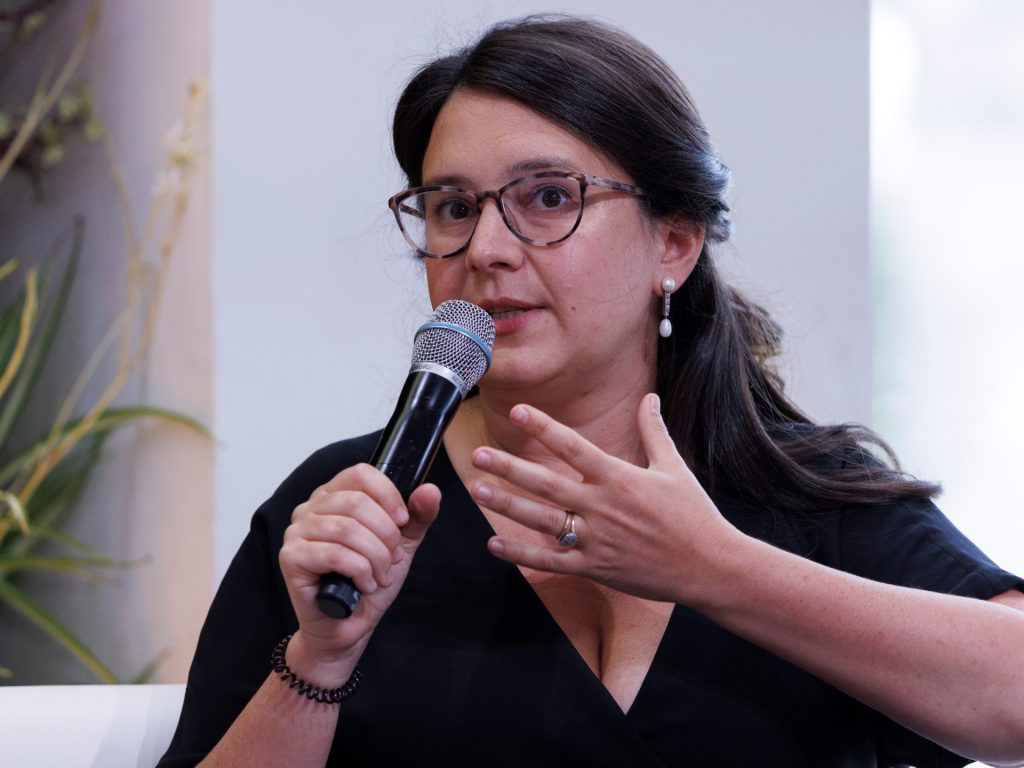
Appointment of media figure known for pro-Israel, anti-‘woke’ stances comes as US media firms feel Trump pressure. Published On 6 Oct 20256 Oct 2025 Click here to share on social media share2 Share The United States media conglomerate Paramount has announced a deal securing the acquisition of the commentary website Free Press and naming its founder, conservative media figure Bari Weiss, as the editor-in-chief of CBS News. The appointment of Weiss, known for her pro-Israel positions and frequent criticism of “woke” politics, comes amid what critics have called an effort to steer CBS in a direction more aligned with the administration of President Donald Trump. Recommended Stories list of 3 itemsend of list Paramount CEO David Ellison on Monday hailed Weiss’s “entrepreneurial drive and editorial vision”. “This move is part of Paramount’s bigger vision to modernise content and the way it connects – directly and passionately – to audiences around the world,” Ellison said in a statement. The latest moves follow a merger between Skydance Media and Paramount, which owns the CBS television network, completed in August. In Skydance’s regulatory bid to buy Paramount, the company promised the US government greater “viewpoint diversity” at CBS, according to a statement from Federal Communications Commission Chairman Brendan Carr in July. Before that approval, Paramount also agreed to pay $16m to settle a defamation lawsuit brought by Trump over a segment on the flagship CBS News programme, 60 Minutes. Media watchdogs widely criticised that suit as a baseless effort to pressure news outlets into more favourable coverage. Ellison, to whom Weiss will report directly, is the son of tech businessman Larry Ellison, one of the richest men in the world and a close Trump ally. Advertisement Weiss founded The Free Press in 2022 after departing from The New York Times, where she had penned a letter saying she had been subjected to “constant bullying” by colleagues who disagreed with her views. She has styled herself as a truth teller often at odds with US legacy media. Recent Free Press articles have taken on diversity, equity and inclusion (DEI) programmes and scepticism over vaccines, both issues spearheaded by the Trump administration. However, the publication has also been at odds with mainstream Republicans in some instances, including in its critical coverage of the party’s positions on abortion. Weiss’s approach has attracted prominent backers, including venture capitalists Marc Andreessen and David Sacks, former Starbucks CEO Howard Schultz, and hedge fund tycoon Paul Marshall. The Free Press has recently been criticised for its writing on Israel’s war in Gaza, including an article titled The Gaza Famine Myth, which questioned famine conditions in the enclave as a result of Israel’s blockade despite findings by the United Nations and medical groups. Adblock test (Why?)
ICC convicts first militia leader for brutal attacks in Darfur
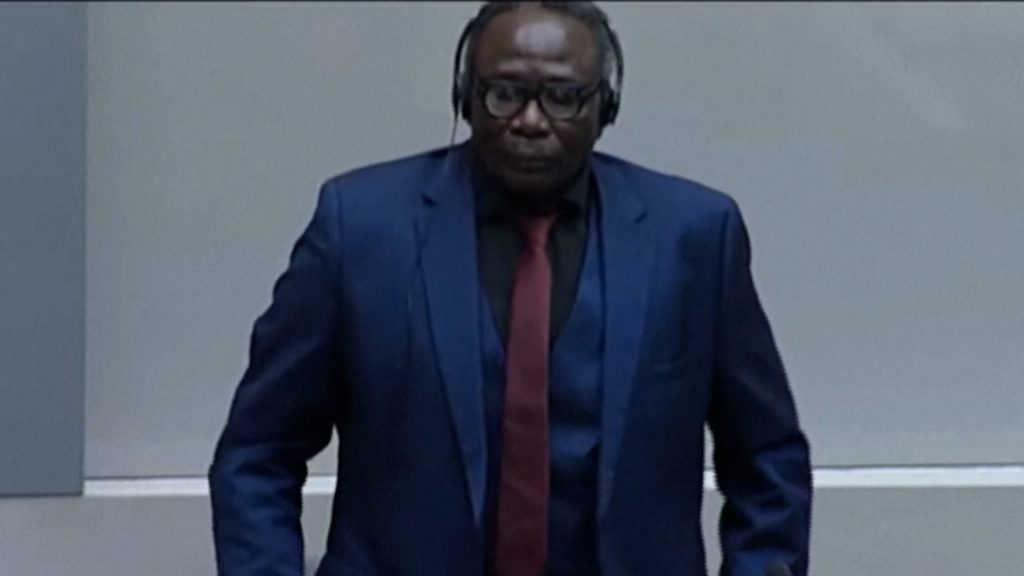
NewsFeed The International Criminal Court has found Sudanese militia chief Ali Muhammad Ali Abd-Al-Rahman guilty of war crimes committed during Sudan’s Darfur conflict more than two decades ago. He was accused of playing a crucial role in the atrocities that killed hundreds of thousands of people. Published On 6 Oct 20256 Oct 2025 Click here to share on social media share2 Share Adblock test (Why?)

